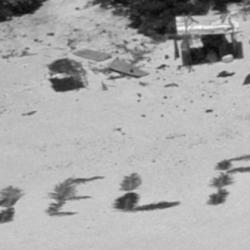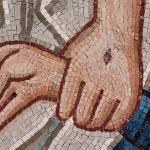One more Romney-related post before moving on …
I said, “Northern Conservative Fundamentalist Baptist Great Lakes Region? Or Northern Conservative Fundamentalist Baptist Eastern Region?”
He said, “Northern Conservative Fundamentalist Baptist Great Lakes Region.”
I said, “Me too! Northern Conservative Fundamentalist Baptist Great Lakes Region Council of 1879? Or Northern Conservative Fundamentalist Baptist Great Lakes Region Council of 1912?”
He said, “Northern Conservative Fundamentalist Baptist Great Lakes Region Council of 1912.”
I said, “Die heretic!” And I pushed him off the bridge …
That classic Emo Phillips bit* gets at something we discuss quite a bit here, particularly on Fridays — the exclusive arrogance of the RTCs (real, true Christians). The authors of Left Behind are just one example of the kind of Christians who seem to delight in separating the wheat of the RTCs from the tares of the reprobate nonbelievers who — falsely, in their view — also claim the name “Christian.” The “wheat and tares” there refers to this parable — which expressly teaches that making such distinctions is Not Your Job because you’re bound to get it wrong:
“While you are pulling the weeds, you may root up the wheat with them. Let both grow together until the harvest.”
That’s not the only thing Jesus had to say about the subject, of course. He also said things like “By their fruits you will know them” (ZOMG — works righteousness!) and “In the same way you judge others, you will be judged” and “Not everyone who says ‘Lord, Lord,'” and many other things that are relevant here. But the parable of the wheat and the weeds/tares does provide, at the very least, a useful general guideline: If someone says they are a Christian, it’s not my place to correct them.
Our Mormon neighbors provide a complicating wrinkle to the application of this rule. “We’re Christians too,” they say, “just like you.” The latter part of that claim — the “just like you” part — is certainly not the case. There are some pretty big differences, such as for example the entire Book of Mormon.
Those of us Christians who do not believe that this newest testament is holy scripture thus find ourselves in a paradoxical situation: We’re asked, out of respect for our Mormon friends, to overlook this difference and to dismiss everything in that book as adiaphora and inconsequential trivia.
I have a hard time viewing such a dismissal as respectful of their faith. I want to say, instead, that the content of their holy book matters — that it shapes their faith and doctrine and identity in a meaningful way. If the Book of Mormon is meaningful, then it also seems reasonable to say that the teachings of this text distinguish Mormons from non-Mormons. And the category of non-Mormons here includes all of those Catholic, Protestant, Orthodox, Coptic and other believers traditionally referred to by the descriptive term “Christians.”
Please note, I am trying to be strictly descriptive here and no judgments are intended or implied in this description. As a descriptive term, the word “Christian” means many things, but it does not mean everything. One of the many things that “Christian” does not mean is “a follower of the prophet Mohammad who regards the Koran and its teachings as sacred.” The proper description for such a person would be “Muslim” or “Islamic.” Acknowledging this distinction is a sign of respect for followers of both faiths. It is a distinction that adherents of both religions would agree with and insist on.
Mormons are also, at this purely descriptive level, distinct from non-Mormon Christians, but this distinction is problematic in a way that the distinction between Christians and Muslims is not. Like most non-Mormon Christians, I’m inclined to say, without intending any disrespect, that one of the many things that “Christian” does not mean is “a follower of the prophet Joseph Smith who regards the Book of Mormon and its teaching as sacred.” Yet many Mormons would find this statement offensive. Such a statement, they say, is not strictly descriptive, but is a form of passing judgment no different from the RTC’s claim that everyone who disagrees with Tim LaHaye’s eschatology is damned to Hell.
This is perplexing even to talk about because the disagreement here includes a dispute over the nature or category of that disagreement. Mormons insist that this disagreement is an intrafaith dispute between insiders — no different from the disputes between, say, Calvinists and Catholics. Non-Mormon Christians, on the other hand, see this as an interfaith disagreement — a dispute between insiders and outsiders. This again suggests a bewildering situation in which non-Mormons seem to be regarding the substance of the Book of Mormon as more significant than it is regarded by Mormons themselves.
I think it is both possible and necessary, in our pluralistic world, to discuss both intrafaith and interfaith disputes civilly and with respect, but I’m not sure how best to do that in this context. It seems the only way to discuss this disagreement without giving offense is to concede the argument and deny that the disagreement matters. I don’t want to do either. Non-Mormon Christians and Mormons believe very different things. We need to be able to acknowledge that without either of us telling the other what they ought to believe.
So — he said, grateful for the robust diversity of perspectives usually found in the comments here and hoping to hear from as wide a range of views as possible — what do you think? Is it possible to maintain the idea that X means anything more than just “all who choose to say they are X” without becoming as exclusive and arrogantly judgmental as the RTCs?
– – – – – – – – – – – –
* Similar Old Joke:
This guy’s sitting on an airplane and the old man next to him pulls out a giant, leatherbound King James Version Scofield Reference Guide Study Bible. Guy says, “Wow, that’s a huge Bible, I take it you’re a Christian too?”
Old man says, “I am a Southern Baptist. What are you?”
Guy says, “United Methodist.”
“I see,” the old man says, wrinkling his nose.
“What?” the guy says, “You think only Baptists are going to Heaven?”
“Of course not,” the old man says. “Not all Baptists.”












